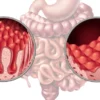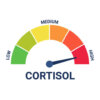
What is Gastritis?
Gastritis is a common and often long-term digestive condition that presents as inflammation in the lining of the stomach.
When considering how to address and possibly cure gastritis, understanding the underlying cause can be an important consideration.
The most common cause of gastritis is infection with Helicobacter Pylori (H. Pylori). Other causes can include autoimmune gastritis and gastritis that is triggered by environmental chemicals.
The symptoms of gastritis include:
- Pain in the upper abdomen
- Feeling full quickly
- Low energy/fatigue
- Feeling sick
- Vomiting
- Brain fog
- Indigestion/dyspepsia
- Brain fog [Source: PubMed, PubMed, PubMed]
Different Types of Gastritis
Gastritis can be classified into 2 forms:
- Non-atrophic gastritis
- Atrophic chronic gastritis
Non-atrophic gastritis is the most common type of gastritis that is caused by H Pylori infection. It’s typically seen as moderate to severe inflammation in the stomach. Alongside this inflammation, there can also be elevated levels of acid secretion.
For somewhere this condition leads to inflammation in the antrial section of the stomach, and no symptoms may be present. However, these patients may be at a 20% increased risk of developing a duodenal ulcer and a marginal increase of developing gastric cancer. [Source: PubMed]
Atrophic gastritis occurs when glands in the stomach are damaged due to inflammation. This can lead to scarring to metaplasia. The atrophy can occur in various areas of the stomach which can be caused by various factors. This includes autoimmunity, H Pylori and living in unsanitary conditions. [Source: PubMed]
Zinc carnosine to Treat Gastritis
Studies have found that a specific form of zinc (zinc carnosine), helps with a range of gastric issues, including gastritis.
Zinc carnosine has been used as a form of treatment for H Pylori infection, one of the main causes of gastritis. [Source: PubMed]
This form of zinc has also been studied to treat stomach ulcers. This is understood to be due to the way in which zinc carnosine supports the repair process across the gut lining. This can reduce inflammation and support healing. [Source: PubMed]
Foods to Avoid with Gastritis
While gastritis food triggers can vary between patients, research has found that certain foods are more problematic than others. Avoiding these triggers can be an important consideration when treating or curing gastritis.
The foods to avoid include:
- Sweets
- Salty foods
- Processed meats
- Spicy foods
- Fried foods
- Alcohol
It has also been reported that course grains can have an irritative effect on the gut as also possibly inhibit the absorption of certain nutrients. This can include grains such as millet and oats.
Additionally, studies have also reported that intake of soybeans and soybean products can lead to an increased risk of atrophic gastritis. [Source: PubMed]
This can mean that certain foods may be best limited, even if they are not triggering symptoms of gastritis as they’re consumed. In these cases, it may be possible for these foods to influence an immunological and inflammatory response, which can contribute to the ongoing nature of gastritis. [Source: PubMed]
Does Gastritis Ever Go Away?
How long gastritis lasts can depend on the underlying causes of the inflammation in the digestive system. For example, if gastritis is caused by an infection of H Pylori, then addressing this infection can be a central part of resolving and curing gastritis. [Source: PubMed]
However, there are more severe or chronic cases of gastritis where it may not be possible to cure symptoms. This can involve autoimmune gastritis.
While the underlying causes of gastritis may be ongoing, the aim of the support approach can be to focus on managing symptoms to improve quality of life. [Source: PubMed]
Can Stress Cause Gastritis?
Emotional stress is associated with a range of digestive conditions such as IBS, IBD and gastritis.
Stress not long impacts the immune response and the secretion of digestive enzymes, but it can also be directly inflammatory. This inflammation may take place in the digestive tract, triggering an inflammatory cascade that can contribute to the onset of gastritis. [Source: PubMed]
If stress is present and contributing to symptoms, a variety of approaches can be considered. These include:
- Meditation and mindfulness practices
- Journaling
- Forest bathing
- Gut-directed hypnotherapy [Sources: PubMed, PubMed, PubMed, PubMed]
Also Read: Can SIBO Cause Gastritis?
Does Alcohol cause Gastritis?
Alcohol consumption can be a significant factor in the development as well as the severity of gastritis. This is due to the irritation and inflammation that alcohol intake can contribute to.
It has also been reported that the severity of the lesions in the gut lining is directly associated with the duration of excess alcohol intake. This can lead to a more severe level of inflammation and injury to the lining of the gut. [Source: PubMed]
Is Curcumin Helpful to Cure Gastritis?
Curcumin is an extract from turmeric root and has been studied for its antioxidant and anti-inflammatory properties.
Studies have found that curcumin can help to heal the gut lining with gastritis that is associated with a H Pylori infection.
The standard treatment for H Pylori is antibiotic therapy. Further research has found that adding a curcumin supplement to antibiotic therapy can improve the health and recovery of the gut lining. [Source: PubMed]
Similar studies have also reported that when curcumin is taken during chronic gastritis, there is less DNA damage and a reduction in histological changes. Due to the involvement of these factors in cancer progress, curcumin may reduce the risk of gastric cancers. [Source: PubMed]
Also Read: How To Relieve Gastritis Burning Pain
Slippery Elm for Gastritis
Slippery elm has several possible benefits for gut health. This includes protecting the gut lining as well as acting as a raft-forming agent to reduce reflux.
While this is used in clinics as an effective recommendation to manage gastritis, research using this as an isolated ingredient is lacking.
However, studies have used slippery elm as an ingredient in combination products. These products contain several gut and gastritis-supporting products to help address and treat gastritis.
The ingredients used in these combination products include:
- Slippery elm
- Curcumin
- Peppermint oil
- Pectin
- Glutamine
- Aloe Vera
- Guar gum [Source: PubMed]
The authors of this study found that the use of this supplement lead to a wide range of digestive symptoms improving.
The symptoms included improvement in:
- Indigestion
- Heartburn
- Regurgitation
- Nausea
An improvement in quality of life was also reported. [Source: PubMed]
Licorice for Gastritis
Licorice is an herbal treatment that is used to address several digestive conditions. These include ulcers, digestive inflammation and gastritis.
This is in the form of DGL (Deglycyrrhizinated Licorice) which has the glycyrrhizin (a potentially harmful substance) removed).
Licorice has been found to help reduce inflammation as well as protect the gut lining from acid. These 2 factors can improve and aid in repair processes and the healing of gastritis and peptic ulcers. [Source: Wiley]
A 2017 study concluded that licorice can be more helpful than acid-suppressive medications in reducing heartburn and symptoms of gastritis. [Source: Informit]
Probiotics for Gastritis and H Pylori
There is not a substantial level of research on using probiotics to treat gastritis directly. However, studies have found that certain probiotics can help to address H Pylori infections.
Due to H Pylori being one of the most common causes of gastritis, addressing H Pylori can be an important way of resolving gastritis. [Source: PubMed]
Research into probiotics and H Pylori has found that they can dramatically improve the effectiveness of antibiotic therapy to treat H Pylori. Not only did the addition of probiotics increase clearance rates, but it also reduced the rates of antibiotic-associated side effects such as diarrhoea. [Source: PubMed, PubMed]
Gastritis and Cancer
Long-term or chronic gastritis is linked to an increased risk of developing gastric cancer. This can be related to underlying causes but also to the extent and intensity of the inflammation.
Due to the role it plays in the development of gastritis, H Pylori is considered a class 1 carcinogen. This is a reason why assessing H Pylori is an essential part of treating gastritis. [Source: PubMed]
Conclusion
Depending on the cause of gastritis, different approaches can be considered to address the underlying factors.
These factors include dietary approaches, supplements to reduce inflammation, supplements to heal the gut lining as well as stress management techniques and practices.
Working with a registered gut health nutritional therapist can be an important part of navigating the support and treatment process.






